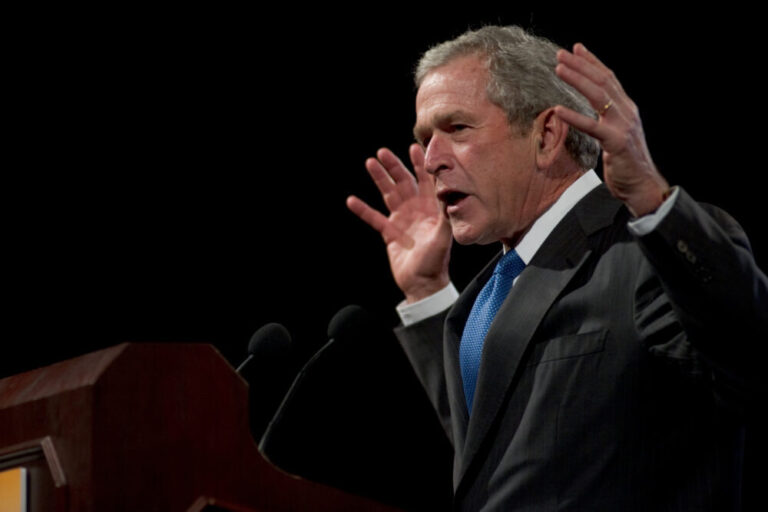In a viral snafu blasted from branded political stage through social media pathways, George W. Bush compared Russia’s attack on Ukraine to the United States’ invasion of Iraq.
“The result is an absence of checks and balances in Russia, and the decision of one man to launch a wholly unjustified and brutal invasion of Iraq — I mean of Ukraine,” Bush said.
While most media commentary fixated on the fub itself, the subsequent acknowledgement holds historical significance.
“Well, that too.”
Speaking in Dallas this afternoon, former President George. W Bush made a significant verbal slip-up while discussing the war in Ukraine.
He tried referencing what he described as the “wholly unjustified and brutal invasion” — but said Iraq, instead of Ukraine. pic.twitter.com/tw0VNJzKmE
— Michael Williams (@michaeldamianw) May 19, 2022
There is no whitewashing or sanitization to the Freudian slip, only a nihilistic nod from yesterday’s stand-in that the U.S. occupation is comparable to Vladimir Putin’s ethnic cleansing. In his 1955 seminar The Ego In Freud’s Theory and in the Technique of Psychoanalysis, the French philosopher Jacques Lacan popularized the theory of the “Big Other,” AKA the collective fiction a society generates and upholds. One never encounters the Big Other directly, but experiences it through interchangeable figureheads, their narratives legitimized through intellectuals and institutions.
Lacan frequently discussed the Soviet Union’s emphasis on the role of authority and hierarchies, influencing other philosophers’ thinking with regard to collective structures and organizations.
“When the illusion that the Big Other did not know can no longer be maintained, the incorporeal fabric holding the social system together disintegrates,” wrote Mark Fisher in Capitalist Realism, comparing former Russian President Khrushchev’s 1965 speech on the failings of communism to the collapse of the Soviet Union. “This is why Khrushchev’s speech in 1965, in which he ‘admitted’ the failings of the Soviet state, was so momentous. It is not as if anyone in the party was unaware of the atrocities and corruption carried out in its name, but Khrushchev’s announcement made it impossible to believe any more that the Big Other was ignorant of them.”
Many years passed between Khrushchev’s speech and the fall of the Berlin Wall, raising the question on whether an acknowledgement of the “Big Other” is an inevitable reference point in a timeline of collapse, or if collapse continues regardless. At a certain point, conditions force authority figures to acknowledge reality and have their “Big Other” moment; softer acknowledgements could likewise be framed as puncturing national fictions.
It is a fairly mainstream understanding in the United States that the Iraq War was a disaster. Numerous authority figures from the Bush administration have broken the “Big Other” façade before. Colin Powell has called his testimony before the United Nations a “blot” on his career. In 2003, the then Secretary of State presented evidence incriminating Saddam Hussein of global weapons crimes. It is now common knowledge that these accusations were almost completely fabricated in order to lengthen the U.S’ stay in the Middle East.
“I’m the one who presented it on behalf of the United States to the world, and [it] will always be a part of my record,” Powell told ABC News. “It was painful. It’s painful now.”
Various UN Directors, including Richard Gowen, have gone on to say that the Iraq war, and the events surrounding Colin Powell, severely damaged America’s reputation within the United Nations.
“Powell’s speech on Iraq marked a turning point in US relations with the UN. I don’t think that Washington’s credibility at the UN has ever entirely recovered from the Iraq war and the false claims on WMDs,” Richard Gowan, UN director at the International Crisis Group, said.
The last two Presidents, Trump and Obama, called the Iraq War a disaster. Much of Obama’s hypocrisy regarding foreign policy can be classified as a muted rupturing of societal narratives. Despite repeated calls for diplomatic solutions to terrorism, Obama went on to launch more drone strikes against Middle Eastern civilians than any President before him. Given that numerous reference points exist around the “Big Other” in regard to U.S. foreign policy in the Middle East, one may question whether U.S. leaders deliberately lied as these moments proliferated.
Much of Putin’s strategic messaging has been centered around not allowing this to happen in the vein of his predecessor Khrushchev, ultimately avoiding a “Big Other” moment similar to George Bush’s.
As the information age progresses, accidental admissions of wrongdoing will persist. An entire lore of memes, conspiracies, and even political ideologies are conceived out of response to the collective fiction upheld by the status quo. Recent events regarding the pandemic and impending economic issues have led to a hysterical paranoia of the U.S. government that may be almost impossible to recover from. Lacan discussed the techniques a society uses to establish its “story” or identity, and Mark Fisher introduced us to the various ways these facades may dissolve. It is largely up to Americans to determine how this dissolution manifests in contemporary times.
Contributions and historical research from Neal Gillespie



